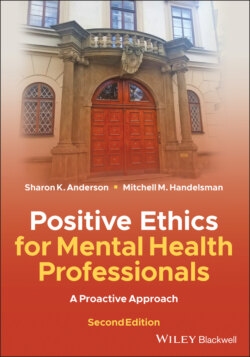Читать книгу Positive Ethics for Mental Health Professionals - Sharon K. Anderson - Страница 8
Preface
ОглавлениеWelcome to our second edition!
Becoming an ethical psychotherapist or counselor is more than memorizing rules—it is a journey. We wrote this book to help students and practitioners navigate this journey towards a professional identity in a way that integrates their personal ethics and values with the professional ethics and traditions of psychotherapy and counseling.
From the feedback we received, readers found the first edition, engaging positive in its approach, and respectful of their backgrounds. We invite readers to become active explorers, not passive recipients of disembodied rules and laws.
In our second edition, we have kept the format and approach of the first edition. We still present a variety of discussions, case scenarios, thought exercises, and writing assignments. These are meant to (a) introduce readers to all the major ethical issues in psychotherapy, including boundaries, confidentiality, informed consent, supervision, and terminating therapy; (b) help readers explore their core, which includes personal needs, motivations, and values; (c) encourage readers to understand the rational and irrational aspects of ethical thinking and decision making; (d) address with readers issues of social responsibility and cultural awareness; and (e) encourage readers to take a proactive and preventive approach to applying ethics to every facet of their professional behavior.
Within this basic structure, however, we have made some important changes in the second edition. We have expanded our discussion of social responsibility. We have paid more attention to how real professionals make real decisions, including discussions of cognitive and other errors (we call these tripping points) that psychotherapists confront in their choice-making process. Finally, we have updated the content and literature cited in the book, including new content around ethics and technology.
Like the first edition, this second edition can be used as a primary or ancillary text for ethics courses in all the mental health fields. Instructors can use it as a supplemental text for courses in professional issues, psychotherapy methods, counseling theories and techniques, and survey courses in clinical and counseling psychology, social work, counseling, and marital and family therapy.
Because this book focuses on the basic aspects of professional ethical identity and ethical reasoning skills, it will be useful to readers over time as they re-adjust their professional identities in reaction to inevitable changes in life situations, professional positions, laws/regulations, and ethics codes.
We also wrote this book to help us teach our own courses, and for our fellow instructors who may be new to teaching ethical issues as an entire course or part of a course. Instructors will find that they can organize class discussions and assignments around the exercises and vignettes from the chapters, or they can use the book to supplement their own methods and materials.
We wish to thank many people who have been involved in the long journey we’ve taken since our initial conversations about an ethics book. Our agent, Neil Salkind of Studio B, who was instrumental in helping us conceive of this book in its present form and encouraging us to undertake the project; our first edition editor Christine Cardone; our current editor Darren Lalonde and associate managing editor Monica Rogers; Sam Knapp and Michael Gottlieb for their essential work on the ethical acculturation model; and Allison Bashe for her work on the ethics autobiography. We’d like to recognize the following people have provided valuable assistance and feedback to us regarding previous iterations of the book: Tamar Ares, Bill Briggs, Pam Daniel, Pam Fritzler, Sharon Hamm, Susan Heitler, Mark Kirchhofer, Teresa Kostenbauer, Margie Krest, Amos Martinez, Natalie Meinerz, Amber Reed, and Deb Wescott.
Any imperfections that remain in the book, of course, are our responsibility alone.
